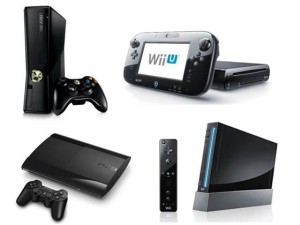Video Gaming, and How it Benefits Us
by Phoenix, HSM team writer
This is perhaps an arguable point, but it’s nonetheless valid: there are benefits to the use and playing of video games.
When my son started school, he was the smallest five-year-old in his class. Not only that, he was the smallest born in my family, weighing in at barely over four pounds (he was premature). When he started school he was happy and excited to be going to school like a big boy. I was the happiest of parents because none of the problems he had because of his premature birth were present any longer. No one in his class (neither teacher nor classmate) knew that he had once had difficulty holding a pencil or that he had once had no real interest in writing or drawing. As with some premature children, my son had motor skill difficulties with his hands. He had been lucky enough to have only a few medical problems after birth. For a year and a half he had been on a breathing monitor due to sleep apnea. But we had been very lucky, and he had been able to — on the few occasions when the monitor went off — correct his own breathing within seconds.
B ut when it came to his hands, his coordination was off. He became frustrated because he couldn’t hold a pencil or crayon correctly; to do so felt awkward to him and uncomfortable, quickly tiring him of trying. I had no idea what could be done for this problem. My doctor advised to just let it be; I was told he would catch up, given time, in all the things that mattered.
ut when it came to his hands, his coordination was off. He became frustrated because he couldn’t hold a pencil or crayon correctly; to do so felt awkward to him and uncomfortable, quickly tiring him of trying. I had no idea what could be done for this problem. My doctor advised to just let it be; I was told he would catch up, given time, in all the things that mattered.
My sister, on the other hand, suggested I give my son a video game to play. I worried a little that he would become hooked on the games, but my son was having difficulty and I was willing to try anything.
He was four years old when I gave him a Sega Saturn. His first game was Sonic the Hedgehog. Sonic 3D Blast, to be exact. In the beginning he showed little interest in the game; in fact there were times I had to ask him if he wanted to play, and when he did he held the controller at an unusual position since it was so much bigger than his hands.
Still. It worked. By the time he began school nine months later, there was no sign that he had ever had any trouble with his fingers or hands. Upon seeing our doctor for the school checkup in the few months after he received his Sega, my pediatrician asked about the concerns I’d previously had.
When I told him what had happened, he conceded it was the first time he had heard such a thing. But he said he would remember it.
My son is nineteen now, and an aspiring writer, artist and drum player, on top of being a lifelong gamer. Oddly, when he snaps his fingers he snaps the third finger and thumb. He has never held his pencil, pen or other implement the same way others do, but he has never looked back or worried that he could not do anything the way others did. His mobility and coordination are normal. He went from Sega, to Nintendo, to Xbox and PS2, and all the handheld  consoles in between. He has one of the highest KDR scores when he plays his shooters. Sonic is still his favorite game, with Zelda and Halo close behind. Presently he is playing Demon Souls again, on PS3.
consoles in between. He has one of the highest KDR scores when he plays his shooters. Sonic is still his favorite game, with Zelda and Halo close behind. Presently he is playing Demon Souls again, on PS3.
I know people will eternally argue the issue of video games being good or bad for kids, but for me, I’m on the benefits side. Interestingly enough, in recent times, it appears there are doctors who are espousing the benefits of gaming. A listing of these benefits has been proven and documented in studies.
In my own experience I know video games can help with children’s motor skills and boost their confidence. Therapeutic benefits of video gaming was listed in a released study on children with illnesses like depression, autism, and Parkinson’s disease; improvements in empowerment, resilience and even boosts in what can only be called a fighting spirit in them are all reported.
Children as young as four years old were studied, and they showed better object control motor skills than children who didn’t play video games at school age. Video games can reduce stress and depression, as a study on some clinically depressed patients showed. The study showed a release of tension and worry as they played and entered into the video game world. Playing video games can even help with pain control. A study showed that by the simple distraction the games offered, a person’s pain was controlled for a time that sometimes lasted after the game was finished. The result: the study group required less pain medication during their healing.
 Eye benefits have been studied in people with cataracts. Playing games like COD and Medal of Honor can help people improve their vision because the games are so fast-paced. Playing the games calls for a more intense amount of attention, as the player must view things more sharply. Another benefit to gaming is one that helps the mind; a higher level of dopamine and adrenaline may make the brain more elastic.
Eye benefits have been studied in people with cataracts. Playing games like COD and Medal of Honor can help people improve their vision because the games are so fast-paced. Playing the games calls for a more intense amount of attention, as the player must view things more sharply. Another benefit to gaming is one that helps the mind; a higher level of dopamine and adrenaline may make the brain more elastic.
Finally, the last two benefits are actually one: cognitive decision making skills increase in the real world, since video games can have a split-second decision needed to save your partner or troops’ lives. Game players have plenty of practice in making decisions. This last reason is a kind of fountain-of-youth effect on the older players out there. Studies showed seniors who play video games even infrequently showed higher levels of happiness and well being, reducing the depression that may sometimes accompany aging.
I will not bother with citing the small mountain of references alluded to in this article; that content is easily found with a quick Google search. I only wish to suggest, amidst the occasional pejorative cries of everything that video gaming supposedly does to rot our bodies and minds, that in fact the exact opposite can also be true.
Share
| Tweet |


